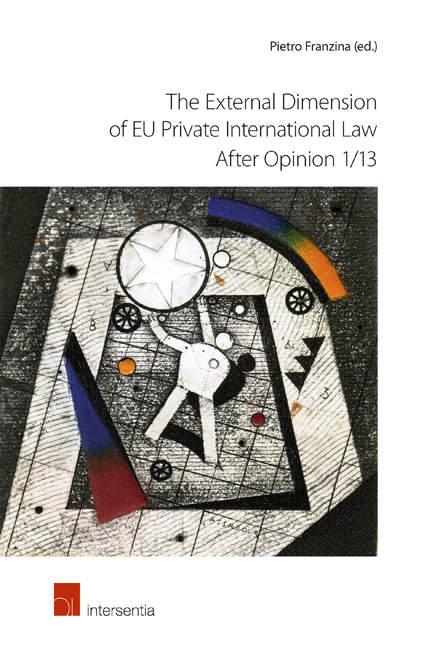Book contents
- Frontmatter
- Preface
- Contents
- PART I THE INTERNATIONAL PROJECTION OF EU PRIVATE INTERNATIONAL LAW - SOME BASIC ISSUES
- PART II OPINION 1/13 AND ITS IMPLICATIONS
- PART III THE CHANGING FEATURES OF EU EXTERNAL RELATIONS IN THE AREA OF PRIVATE INTERNATIONAL LAW
- PART IV EU LEGISLATION ON PRIVATE INTERNATIONAL LAW AND EXTRA-EUROPEAN SITUATIONS
- Frontmatter
- Preface
- Contents
- PART I THE INTERNATIONAL PROJECTION OF EU PRIVATE INTERNATIONAL LAW - SOME BASIC ISSUES
- PART II OPINION 1/13 AND ITS IMPLICATIONS
- PART III THE CHANGING FEATURES OF EU EXTERNAL RELATIONS IN THE AREA OF PRIVATE INTERNATIONAL LAW
- PART IV EU LEGISLATION ON PRIVATE INTERNATIONAL LAW AND EXTRA-EUROPEAN SITUATIONS
Summary
The scope of the external competence of the EU as regards judicial cooperation in civil matters, the conditions upon which this competence is to be regarded as exclusive and the principles that should govern its exercise are among the most controversial issues that arise in connection with the emergence of a regional system of private international law in Europe.
The external dimension of EU private international law provoked discussions even before the European legislature adopted its first measures in this area. The matter has since been one of keen interest for Member States and in the relationship between the political institutions of the Union.
The Court of Justice, for its part, has had various opportunities, over the years, to consider the legal problems involved in the international projection of judicial cooperation in civil matters. Its key decisions in this regard, Opinion 1/03 of 7 February 2006 on the competence of the Community (as it was then) to conclude the revised Lugano Convention on jurisdiction and the recognition of judgments in civil and commercial matters, and Opinion 1/13 of 14 October 2014 on the Union's competence regarding the acceptance of third States’ accessions to the Hague Convention of 1980 on the civil aspects of international child abduction, provided a significant contribution to the understanding of the topic.
The debate, however, has not ended with the Court's interventions. The views expressed by the Court, heavily criticised by some commentators, have been triggering further discussions, and several questions are awaiting answers.
The statements made by Germany and the United Kingdom upon the adoption of a Council Decision authorising Austria and Malta to ratify or accede to the Hague Convention of 1965 on the service of documents abroad in the interest of the Union provide the most recent illustration of the uncertainties that still surround the development of the external relations of the EU in judicial cooperation. Taking into account the characteristics and the content of the Hague Service Convention and of EU legislation on the service of documents from one Member States to another, the two delegations expressed their doubts as to whether the conclusion of the former should be regarded as falling within the exclusive external competence of the Union.
- Type
- Chapter
- Information
- Publisher: IntersentiaPrint publication year: 2016

